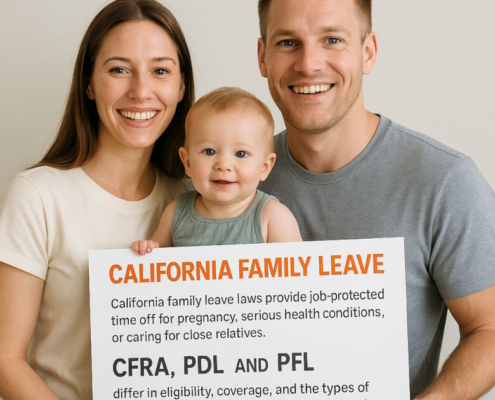Terminating Employee with Cancer
Cancer is protected under the Disability Act, which protects an employee from retaliation and discrimination because of health impairment related to a cancer diagnosis. An employer cannot discriminate against an employee upon discovering that an employee has a severe illness or cancer.
Author: Brad Nakase, Attorney
Email | Call (888) 600-8654
An employer cannot terminate an employee with cancer solely because of the cancer diagnosis. However, the employer may terminate an employee with cancer for the same reasons as any other employee. Under the Federal Rehabilitation, employers cannot discriminate because of a person’s cancer. According to the United States Equal Employment Opportunities Commission (EEOC), cancer is not always considered a disability. Workers with cancer are protected against job discrimination under the ADA as long as they can perform their job.
The unfortunate reality is that over one and a half million individuals are diagnosed with cancer every year. As one of the most frightening and stressful diagnoses that a patient can get from a doctor, cancer often causes an individual to suffer from depression and anxiety. Not only does the patient suffer, but their family and friends are affected as well. But things can become even worse when a company decides to terminate an employee suffering from cancer, or retaliate against them. With an experienced attorney’s help, an employee with cancer can hold their employer legally liable for discrimination based on disability.
Some common questions about working while battling cancer include the following:
- Can I make an employer grant me time to go to chemotherapy sessions? It depends on the the kind of work you do, your overall health, state of cancer, and type of treatment you’re getting.
- Can I be terminated for getting cancer? You cannot get terminated because of cancer, but you can be terminated for any reason that applies to other employees.
- Is cancer recognized as a disability according to California and federal law? Under California’s FEHA, cancer is considered a “medical condition,” rather than a disability. According to the United States Equal Employment Opportunities Commission (EEOC), cancer is not always considered a disability.
- Can I sue my company for terminating me due to my cancer? It depends on why you were terminated from your job. You can sue the employer for terminating because you were diagnosed with cancer. You may not sue the employer for termination if the reason for termination applies to all employees.
In this article, our wrongful termination attorney in Los Angeles will discuss terminating an employee with cancer as follows:
Is Cancer Considered a Disability?
According to the United States Equal Employment Opportunities Commission (EEOC), cancer is not always considered a disability. Under California’s FEHA, cancer is considered a “medical condition,” rather than a disability.
When an employer treats an employee worse than others due to the employee’s cancer diagnosis, then this qualifies as a case of cancer disability discrimination. Federal and California law includes many regulations which allows cancer patients to take time off. These laws also prevent cancer sufferers from being wrongfully terminated and discriminated against. These regulations include the following:
- The Americans with Disabilities Act (ADA): the ADA stands against discrimination based on a real, perceived, or record of disability. Cancer is counted as a disability according to the ADA.
- The Family and Medical Leave Act (FMLA): The FMLA allows cancer patients do take up to twelve weeks of unpaid leave. Under FMLA, a cancer patient can keep their health insurance benefits while taking time off. They may also return to a similar or comparable position when they return to work.
- The Federal Rehabilitation Act: Under Federal Rehabilitation, employers are not allowed to discriminate on the basis of an employee’s cancer diagnosis. Similar to the ADA, this act is only relevant for federal workers.
- The Fair Employment and Housing Act (FEHA): FEHA is a California law that forbids discrimination based on disability. Under FEHA, cancer is defined as a disability.
- California Family Rights Act (CFRA): The CFRA is akin to the FMLA. That said, there are bonus protections that come with the CFRA.
How to Handle an Employer Who Discriminates Because of Cancer
When an employee learns that they have been diagnosed with cancer, they should be sure to let their employee know about their required treatment regimen. They should be sure to put this notice in writing. It is also essential to keep one’s doctor updated as well. Employees should let their doctor know the most critical elements of their job. Once employees get their doctor’s notes in writing, they should give them to Human Resources. Occasionally, an employer will reject an employee’s cancer restrictions because the employee did not provide notice of their needed accommodations in writing.
The next thing an employee should do is inform their employer that he or she will require accommodations. In general, employers are required to offer reasonable accommodations, which may include (and are not limited to) the following:
- Leave to visit the doctor or heal after treatment
- Time off during work to rest
- Altered work schedule
- Handing some duties off to another worker until the patient has recovered enough to handle them
- Changes to the work environment, like a change in room temperature
What to do if ADA accommodation is denied?
A worker who believes the employer has violated the cancer disability act by wrongly denying a reasonable accommodation may:
- File a complaint with the EEOC
- File a complaint with the California Labor Commissioner
- Consult with a California employment lawyer and sue
If an employee has been denied the reasonable accommodations they requested, then there may exist a few grounds for a lawsuit. The causes of action available to an employee under federal and California law include the following:
- Disability discrimination that violates the Fair Employment and Housing Act (FEHA). Under California law, failure to accommodate qualifies as a kind of discrimination.
- Not offering reasonable accommodations, violating the FEHA. Under California law, the failure to accommodate disabilities is a cause of action on its own.
- Failure to participate in the interactive process in violation of the FEHA.
- Not offering a workplace without retaliation in violation of the FEHA.
- Wrongful firing that violates public policy.
Because failure to accommodate a disabled employee within reason is unlawful, an employee could be able to receive damages. An employee can also file a lawsuit for failure to engage in the interactive process. Also, according to the FEHA, requesting a reasonable accommodation is a protected activity. Therefore, a company cannot retaliate or discriminate against an individual who requests an accommodation by terminating an employee with cancer.
Have a quick question? We answered nearly 2000 FAQs.
See all blogs: Business | Corporate | Employment Law
Most recent blogs:
Contact our attorney.
































